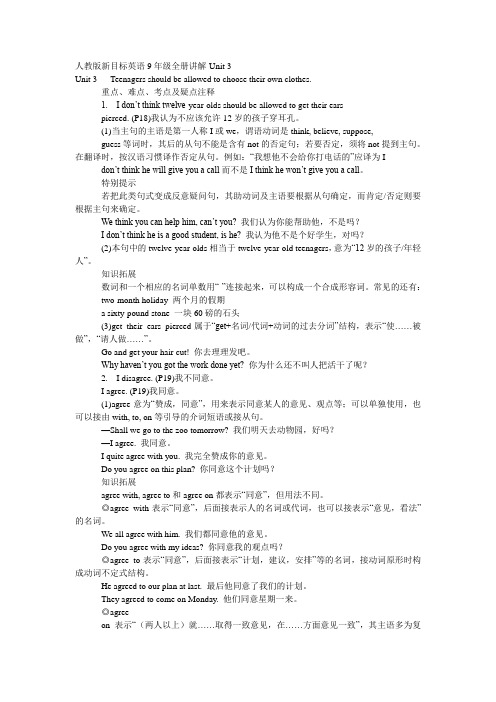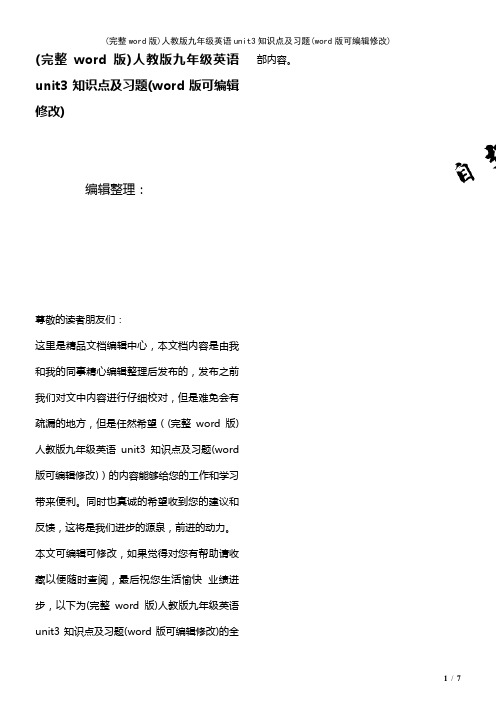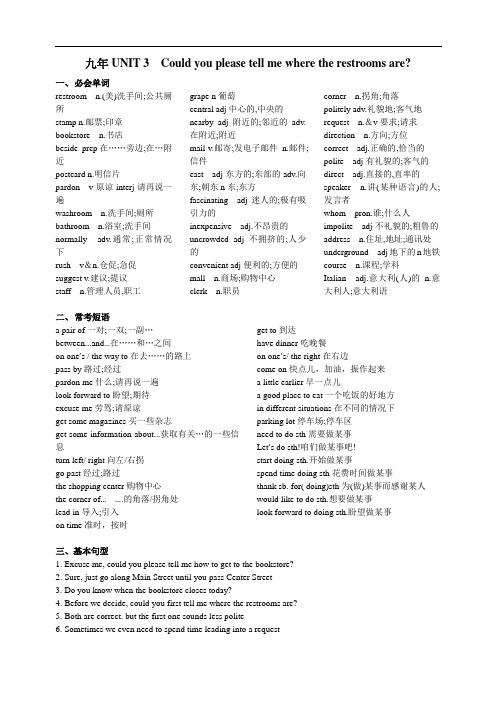人教版九年级英语Unit3知识点 精讲及练习题
人教版九年级英语unit3-讲解和练习

Unit 3: Teenagers should be allowed to choose their own clothes.【重点短语】take the test 参加考试pass the test 通过考试fail a test 考试失败be strict with+人对某人严格be strict in+事物对某事要求严格stay up 熬夜clean up 打扫整理learn from each other 互相学习concentrate on 专注于one’s own 某人自己的the other day 前几天,几天前= a few days ago have an opportunity to do sth.有机会做某事=have a chance to do/ of doingevery other day每隔一天(每两天)= every two daysat present 现在,目前in this way 用这种方法in the way 挡道的,妨碍人的on the way 在路上on one’s way to 在某人去…的路上by the way 顺便说(问)be serious about 对…认真care for在乎、关心【语言点】1. Teenagers should be allowed to choose their own clothes.应该允许青少年选择自己的衣服。
allow允许allow + n. 允许某事如:我们不允许这样的事(发生)allow sb. to do sth. 允许某人做某事(主动语态)如:妈妈允许我每晚看电视。
allow doing sth. 允许做某事如:They don't allow smoking here.be allowed to do sth. 被允许做某事(被动语态)如:莉莉被允许去青岛。
2.I don’t think sixteen-year-olds should be allowed to drive.宾语从句中否定转移:若宾语从句跟在think, believe等表示“想,认为"的动词之后,而主语为第一人称时,句子的否定体现在主句上。
人教版九年级英语unit3知识点,单词讲解

人教版新目标英语9年级全册讲解-Unit 3Unit 3 Teenagers should be allowed to choose their own clothes.重点、难点、考点及疑点注释1. I don’t think twelve-year-olds should be allowed to get their earspierced. (P18)我认为不应该允许12岁的孩子穿耳孔。
(1)当主句的主语是第一人称I或we,谓语动词是think, believe, suppose,guess等词时,其后的从句不能是含有not的否定句;若要否定,须将not提到主句。
在翻译时,按汉语习惯译作否定从句。
例如:“我想他不会给你打电话的”应译为I don’t think he will give you a call而不是I think he won’t give you a call。
特别提示若把此类句式变成反意疑问句,其助动词及主语要根据从句确定,而肯定/否定则要根据主句来确定。
We think you can help him, can’t you? 我们认为你能帮助他,不是吗?I don’t think he is a good student, is he? 我认为他不是个好学生,对吗?(2)本句中的twelve-year-olds相当于twelve-year-old teenagers,意为“12岁的孩子/年轻人”。
知识拓展数词和一个相应的名词单数用“-”连接起来,可以构成一个合成形容词。
常见的还有:two-month holiday 两个月的假期a sixty-pound stone 一块60磅的石头(3)get their ears pierced属于“get+名词/代词+动词的过去分词”结构,表示“使……被做”,“请人做……”。
Go and get your hair cut! 你去理理发吧。
人教版九年级英语unit3知识点及习题(K12教育文档)

(完整word 版)人教版九年级英语unit3知识点及习题(word 版可编辑修改)1 / 7(完整word 版)人教版九年级英语unit3知识点及习题(word 版可编辑修改)编辑整理:尊敬的读者朋友们:这里是精品文档编辑中心,本文档内容是由我和我的同事精心编辑整理后发布的,发布之前我们对文中内容进行仔细校对,但是难免会有疏漏的地方,但是任然希望((完整word 版)人教版九年级英语unit3知识点及习题(word 版可编辑修改))的内容能够给您的工作和学习带来便利。
同时也真诚的希望收到您的建议和反馈,这将是我们进步的源泉,前进的动力。
本文可编辑可修改,如果觉得对您有帮助请收藏以便随时查阅,最后祝您生活愉快 业绩进步,以下为(完整word 版)人教版九年级英语unit3知识点及习题(word 版可编辑修改)的全部内容。
Unit3 Could you please tell me where the restrooms are ?短语:1. excuse me 劳驾,请原谅,打搅2. get to到达3. get some magazines 得到一些杂志4. have dinner 吃晚餐5。
get some information about 获取有关……。
的一些信息6. a pair of一双,一对,一副 7。
on one’s / the right 在右边8。
turn left / right 向左 / 右拐 9。
between…。
and…..在….。
和….。
之间10. go past经过,路过 11。
come on 快点儿,过来,加油12。
on one’s way to 在某人去…….的路上 13。
a little earlier 早点儿14。
the shopping center购物中心 15. a good place to eat 一个吃饭的好地方16. the corner of ……。
人教版初中英语9年级Unit3知识清单 习题 (含解析)

九年UNIT 3 Could you please tell me where the restrooms are?一、必会单词restroom n.(美)洗手间;公共厕所stamp n.邮票;印章bookstore n.书店beside prep在……旁边;在…附近postcard n.明信片pardon v原谅interj请再说一遍washroom n.洗手间;厕所bathroom n.浴室;洗手间normally adv.通常;正常情况下rush v&n.仓促;急促suggest v.建议;提议staff n.管理人员,职工grape n葡萄central adj中心的,中央的nearby adj附近的;邻近的adv.在附近;附近mail v.邮寄;发电子邮件n.邮件;信件east adj东方的;东部的adv.向东;朝东n东;东方fascinating adj迷人的;极有吸引力的inexpensive adj.不昂贵的uncrowded adj不拥挤的;人少的convenient adj便利的;方便的mall n.商场;购物中心clerk n.职员corner n.拐角;角落politely adv.礼貌地;客气地request n.&v要求;请求direction n.方向;方位correct adj.正确的,恰当的polite adj有礼貌的;客气的direct adj.直接的,直率的speaker n.讲(某种语言)的人;发言者whom pron.谁;什么人impolite adj不礼貌的;粗鲁的address n.住址,地址;通讯处underground adj地下的n地铁course n.课程;学科Italian adj.意大利(人)的n.意大利人;意大利语二、常考短语a pair of一对;一双;一副…between...and…在……和…之间on one’s / the way to在去……的路上pass by路过;经过pardon me什么;请再说一遍look forward to盼望;期待excuse me劳驾;请原谅get some magazines买一些杂志get some information about...获取有关…的一些信息turn left/ right向左/右拐go past经过;路过the shopping center购物中心the corner of…….的角落/拐角处lead in导入;引入on time准时,按时get to到达have dinner吃晚餐on one’s/ the right在右边come on快点儿,加油,振作起来a little earlier早一点儿a good place to eat一个吃饭的好地方in different situations在不同的情况下parking lot停车场;停车区need to do sth需要做某事Let’s do sth!咱们做某事吧!start doing sth.开始做某事spend time doing sth花费时间做某事thank sb. for( doing)sth为(做)某事而感谢某人would like to do sth.想要做某事look forward to doing sth.盼望做某事三、基本句型1. Excuse me, could you please tell me how to get to the bookstore?2. Sure, just go along Main Street until you pass Center Street3. Do you know when the bookstore closes today?4. Before we decide, could you first tell me where the restrooms are?5. Both are correct. but the first one sounds less polite6. Sometimes we even need to spend time leading into a request四、重点语法(3)疑问词引导的宾语从句1. Could you please tell me where the restrooms are?请你告诉我洗手间在哪里好吗?2. Excuse me, could you tell us when the band starts playing this evening?打扰一下,你能告诉我们今天晚上乐队什么时候开始演奏吗?以上句子均为含有宾语从句的复合句。
人教版九年级英语上册unit3基础知识复习及训练(含答案)

基础知识点复习Unit 3 Could you please tell me where the restrooms are?一.重点短语1. turn left/right 向左/右转2. on one‟ s left/right 在某人的左/右边3. go along Main Street 沿着主大街走4. beside the bank 在银行附近5. between....and... 在.......和.......之间6. go to the third floor 去三楼7. pass by=go past 路过,经过8. how to use the right (proper) language 9. be special about.. . 有……独特之处 10. pardon me 请再说一次11. come on 过来;加油12. one one’ s way to... 在去.......的路上13. something to eat一些吃的东西 14. hold one‟ s hand 抓住某人的手15. mail(send) a letter 寄信16. spend time leading in to a request花时间导入一个请求17. in the shopping center 在购物中心 18. any other....其他任何一个...19. in different situations 在不同情况下 20. park one‟ s car 停车21. an underground parking lot地下停车库 22. such as 例如23. thank sb. for doing sth. 为…感谢某人24. look forward to (doing)…期盼…25. meet sb. for the first time 第一次见到某人26. No problem.没问题。
2017年人教版初中英语九年级英语课文知识点同步精讲unit3

2017年人教版初中英语九年级英语课文知识点同步精讲Unit three Could you please tell me where the restrooms are? Section A知识点1. Get some information about the town.Information: 意思为,请判断是可数名词还是不可数名词。
我需要有关这台新计算机的一些信息。
I about the newcomputer.拓展:information/ news/ messageNews的意思是:是名词(可数还是不可数?)Message的意思是:是名词(可数还是不可数?)知识点2. The bookstore is on your right, beside the bank.Beside是介词,意思为:.指偶然地靠近,可表示动态也可表示静态。
安娜坐在我的旁边。
Anna sat beside me.这位老人住在湖边的一所房子里。
注意:beside不等于besides。
Besides也是介词,意为:除。
之外(还)Besides还可以做副词,意为:而且。
除了牛肉和猪肉外,妈妈还买了鸡肉。
Mom also bought some chicken besides beef and pork. --这周六要和我去打篮球吗?--这周六我没有空,而且,我也不是很喜欢打篮球。
--Do you want to play basketball with me this Saturday?--No, I am busy this Saturday. Besides, I don't like basketball very much.知识点3. There's a bookstore between the bank and the supermarket.Between 是介词,一般指:在两者之间。
Between ...and... 为固定搭配。
人教版九年级英语unit3知识点及习题

人教版九年级英语u n i t3知识点及习题(总5页)--本页仅作为文档封面,使用时请直接删除即可----内页可以根据需求调整合适字体及大小--Unit3 Could you please tell me where the restrooms are短语:1. excuse me 劳驾,请原谅,打搅2. get to到达3. get some magazines 得到一些杂志4. have dinner 吃晚餐5. get some information about 获取有关…….的一些信息6. a pair of一双,一对,一副7. on one’s / the right在右边8. turn left / right 向左 / 右拐9. between…..and…..在…..和…..之间10. go past经过,路过 11. come on 快点儿,过来,加油12. on on e’s way to 在某人去…….的路上 13. a little earlier 早点儿14. the shopping center购物中心 15. a good place to eat 一个吃饭的好地方16. the corner of …….的角落 / 拐角处 17. in different situations在不同的情况下19. on time准时,按时 20. look forward to 盼望,期待21. pardon me 什么,请再说一遍短语句型:1. not…..until…… 直到…..才……2. Let’s do sth. 让我们做某事吧3. spend time doing sth. 花费时间做某事4. thank sb. for (doing) sth. 为(做)某事而感谢某人5. would like to do sth. 想要做某事6. It seems (that)… It seems a rock band plays there every evening.那里好像每天晚上都有乐队演奏。
人教版九年级英语Unit3知识点总结

Unit 3 Section A 1a-2d 知识提纲一、词法及句型1. beside 介词,在……旁边=next to2.go past = pass v. 路过I pass a market when I go home .3.between prep. 在……之间,用于两者between…and …在……和……之间,前后可以是两个不同的人,物及时间among prep.在……之间,用于三者或三者以上I sat down between Tom and Jim .Don’t eat snacks between meals . 正餐之间不要吃零食。
They live among the mountains . 他们住在群山之间。
4.pardon ,pardon me 主要用于没听清对方说话时,恳请对方再说一遍。
Excuse me 主要用于吸引别人的注意,有“麻烦,打扰”之意。
用于事前。
Sorry 对不起,主要用于做错事后道歉用的。
二、交际运用——有关问路的用语1)Excuse me , 劳驾①where is ……? ……在哪?②how can I get to ……?我怎样去……?③which is the way to ……?去……是哪一条路?④can you tell me the way to the …please ?你能告诉我去……的路吗?⑤could you tell me how to get to the …please ?你能告诉我怎样去……吗?⑥can you tell me how I can get to the …please ?你能告诉我怎样去……吗?⑦can you tell me where the nearest…is ?你能告诉我最近的……在哪吗?2). How far is it ? 有多远?Is it far from here ? 离这儿远吗?3). Which bus should I take ? Which number do I need ?我该乘几路车/指引方向:1). Walk / Go along / down the road /the street ;沿着这条路/ 街走。
- 1、下载文档前请自行甄别文档内容的完整性,平台不提供额外的编辑、内容补充、找答案等附加服务。
- 2、"仅部分预览"的文档,不可在线预览部分如存在完整性等问题,可反馈申请退款(可完整预览的文档不适用该条件!)。
- 3、如文档侵犯您的权益,请联系客服反馈,我们会尽快为您处理(人工客服工作时间:9:00-18:30)。
新目标九年级Unit 3课前检测1、重点单词1. 在旁边___________2. 地铁,地下的 n&adj___________3. 仓促,急促n&v ___________4. 课程,学科___________5. 职工,管理人员___________6. 发言者___________7. 角落___________ 8. 建议,提议v ___________9. 中央的,中心的___________ 10. 不礼貌的adj ___________11. 不昂贵的___________ 12. 礼貌地adv.___________13. 不拥挤的___________ 14. 商场,购物中心___________15. 便利的,方便的___________ 16. 迷人的 ___________17. 方向,方位___________二、重点短语1. 取一些钱__________2. 握住手___________3. 经过,路过___________4. 对不起,原谅我___________5. 对做某事感到兴奋___________6. 在不同的/某些场合___________7. 在某人去…的路上___________8. 依靠_________9. 过来,快点,加油___________ 10. 引入一个要求_________11. 换钱__________ 12. 期盼__________13. 在主街和中央街的拐角处___________三、重点句型(必背句型)1. Could you please tell me how_________(get)to the post office?2. I wonder where _________ _________ _________next.(我们该去哪里)3. Could you tell us when the band _________ _________ this evening?(开始演出)4. It is important to know how _________(ask)for help politely. We also need to learn how to ________ __________ (polite)when we ask for help.5. Good speakers change the way________ __________ (他们讲话的)in different situations. The expressions they use might depend on whom ________ __________ ________ __________(他们跟谁讲话)or howwell they know each other.6. Sometimes we even need to spend time ________ (lead)in to a request.7. It might seem more difficult to speak ________(polite)than directly. However, it is important to learn how to use________ __________ ________ (恰当的语言)in different situations.8. I’m looking forward to ________ __________(你的答复)I’m looking forward to ________ __________ ________(收到你的来信)四、重点语篇Could you please…?“Peter, could you please tell me your e-mail address?” or “Peter, tell me your e-mail address.” are similar r______ for information. B_____ are correct, but the first one sounds less polite. That is b______ it is a very direct question. Good speakers change the way they speak in different s________. The expressions _______ _________(depend) on w_____ they are speaking to or how ______ they know each other. A_______ it might seem more difficult to speak politely than directly, it is important _______(learn) how to use the right language.知识梳理一、词语辨析1. a pair of--- 一对;一双;一副, 其谓语动词由pair的单复数决定. 如: This pair of shoes is very comfortable.Look! There are three pairs of shoes over there.2.beside, besidesbeside: 介词,意为“在旁边”besides:1)介词,意为“除此之外还有----”,2)副词,意为“而且,还有”A girl is standing beside the tree. 在旁边We also like basketball besides tennis. 除此之外还有----I don’t mind carrying these things to your home. Besides, the walk will be good for my health. 而且3. seem: 可用作连系动词或实意动词,意为“似乎;好像”,句型结构如下: 1)seem + 形容词似乎,看起来2)seem + to do sth. 似乎,好像做某事3)It seems/seemed + that从句看起来好像---,似乎---You seem happy today.Mrs. Green doesn’t seem to like the idea. It seems that Mrs. Green doesn’t like the idea.4. suggest (v.) ------suggestion( n) 意为“建议”suggest 后跟名词或doing形式I suggest the restaurant in Water World.I suggested going in my car.二、语法链接宾语从句(二)根据引导宾语从句的连接词划分,宾语从句可分为三类:由that引导的宾语从句、由if/whether引导的宾语从句以及由特殊疑问词引导的宾语从句。
本单元主要学习由特殊疑问词引导的宾语从句。
宾语从句是特殊疑问句时,直接用特殊疑问词作引导词。
连接代词(who, whom, whose, what, which)和连接副词(when, where, why, how)在宾语从句中充当某个成分(主语、宾语、定语、状语等)。
在学习这类宾语从句时,要特别注意以下几点:1.宾语从句的语序不管哪类宾语从句,总是用陈述语序:连接词+主语+谓语+其他。
当连接词本身就是句子的主语时,后面直接跟谓语和宾语。
Could you tell me where I can buy some magazines?你能告诉我在哪儿可以买到一些杂志吗?He asks me when I'll come back tomorrow.他问我明天什么时候返回。
2.宾语从句的时态(1)若主句的时态是一般现在时,从句的时态不受影响。
Nobody knows where he comes from.没人知道他来自哪里。
(2)若主句的时态是一般过去时,宾语从句则用相应的过去时态(一般过去时、过去进行时、过去将来时或过去完成时)。
I asked him when he would return the book to the library.我问他何时把书还给图书馆。
(3)若宾语从句陈述的是客观真理,则仍用一般现在时。
Our teacher told us that light travels faster than sound.我们的老师告诉我们光比声音传播得快。
巩固练习一、词汇练习1. It’s c to live next to a supermarket2. P me, do you know if there is a bookstore around here?3. The word “restroom” has the same meaning as the word “w “.4. Now we can m a letter at home by a computer instead of going to thepost office.5. Japan is to the e of China.6. There is much time left. You don’t need to r .7. Please tell me the c answer.8. I’m looking forward to (see) you again.9. We should speak to the old (polite).10. I don’t know how long he spent (drive) a car to shanghai yesterday.11. When we have a meeting, we should listen to the (speak) carefully.12. She is an (Italy) singer.二、单项选择( )1. —Tom wants to know if you will have a picnic tomorrow.—Yes. But if it ________, we'll play chess instead.A.will rain B.rained C.is raining D.rains( )2. He suggested that you should ________there tomorrow.A.going B.went C.goes D.go( )3. In our country, it’s _______ to stick your chopsticks into your food.A. rightB. politeC. rudeD. kind( )4. —Show me the map, please. I wonder ________.—Look, it's here, in the east of China, near Taiwan Province.A.where is Diaoyu Island B.where Diaoyu Island isC.what is Diaoyu Island like D.where Island is Diaoyu( )5. –-Excuse me, could you tell me _______ ?--Go along this street until you see some buildings with golden roofs.A. how I can go to Tianning Temple.B. how often you go to Tianning Temple.C, how soon you will go to Tianning Temple.D. how many times you have been to Tianning Temple.( )6. —Shall we go for a picnic tomorrow?—Well, it all ___________ the weather.A. belongs toB. happens to C .depends on D. concentrate on ( )7. On the way ________ the mountain village, we found the local housesdifferent from ours.A.to B.by C.at D.on( )8. —I'm doing a survey. Could you tell me ________?—Sure. I usually go to work at 7:00 a.m.A.why you go to work B.how you go to workC.when you go to work D.who you go to work with( )9.—You seem ________.What's up, sir?—I can't find my ticket, but it's time to check in.A.sleepy B.hungry C.tired D.worried( )10.—That actor often joins in different activities in Beijing. Do you know ___?—For 5 years.A.how soon he will come back B.how long he has stayed thereC.how long has he stayed there C.how often does he go there( )11. Julie's father ______ to London last month. He _______ there three times.A.went; had gone B.has gone; has beenC.went; has been D.has been; had gone( )12. Please hold on to your dream ________ one day it comes true.A.if B.until C.unless D.though。
